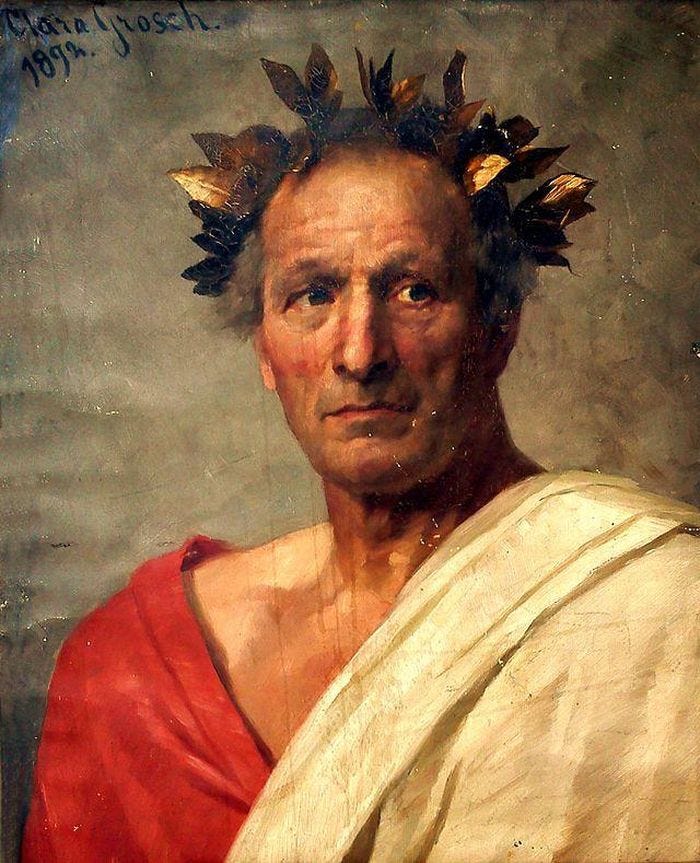Caesarism
A Spenglerian Perspective
The inspiration to delve yet again, albeit briefly, into the fascinating turnabouts of history, as they pertain to cycles, comes from a recent and prescient Substack essay written by Morgthorak the Undeadtitled, “Only a Caesar can stop woke communist censorship in the GAE.” I linked the piece in my footnotes.1
The implication here is rather straightforward. While the means of solving our present dilemma could, I suppose, reside in a democratic election, it is as likely to require suspension of the Constitution, “if only for a little while” - say two weeks to flatten the curve. Anyway, Caesars, if Caesarism is to be, have scant use for constitutions.
Ironically, a benevolent tyrant may be required to free us from malevolent tyranny. Sounds far fetched, you say? Well, ‘tis a certainty. The fault is not in our stars, but in ourselves.
What Would Spengler Say?
Oswald Spengler, the German historian and philosopher, is best known for his magnum opus, "The Decline of the West," in which he presents a cyclical model of history. To Spengler, great cultures rise and fall in predictable patterns, much like seasons of the year. Each culture, he argued, has its own unique zeitgeist (or soul) and, like life, goes through the phases of birth, growth, fulfillment, decline, and decay.
A core component of Spengler's theory is the concept of 'morphological similarity,' where he posits that although the specific details and timelines might differ, all cultures undergo similar overarching patterns. We covered this more thoroughly in our piece, Kali Yuga. The cyclical view of history contrasts with the linear progression model of history, which at the time Spengler wrote Decline (early 19th century), was popular among Western thinkers.
Central to our discussion is Spengler's prediction of the coming Age of Caesarism for the West, which he foresees as a phase of decline preceding the final decay. So, what exactly is Caesarism in Spengler's view?
Here I abandon peace and desecrated law. Fortune, it is you I follow. Farewell to treaties. From now on war is our judge. ~ Julius Caesar
Caesarism is a term Spengler borrows from the rise of Julius Caesar in Rome, symbolizing the transition from a culture's democratic phase to a form of non-despotic autocracy. It emerges when a culture's soul has exhausted its creative energies and can no longer uphold its institutions, particularly its democratic ones.
The populace, disillusioned with the divisive politics and cultural decay, starts longing for order and strong leadership, a phase that in the present time is both nascent and insidious. It will pave the way for the rise of a singular, charismatic leader (or a series of such leaders) who brings stability, albeit at the cost of individual freedoms and the democratic spirit. It’s difficult to image Joe Biden as the first GAE (Great American Empire) Caesar, but read on.
The populace, however, is all too willing, even cheerfully eager, to sacrifice their cherished democratic freedoms in return for protection against some perceived threat, real or imagined, as we clearly witnessed during Covid. We can thus assert that Caesar’s hour upon the stage, whether it began in the U.S. with Brandon or not, is a ticking clock and worldwide phenomena.
Spengler believed that this phase was characterized by the triumph of will over intellect, with these 'Caesars' drawing their power not from any moral or traditional right, but sheer force of will and the promise of stability. As he noted, this phase would also witness the decline of the traditional state and the rise of what he termed as 'the immense formlessness' — centralized, impersonal powers where the individual feels increasingly alienated.
There’s something about Spengler’s expression, “immense formlessness” that seems to fit Brandon exceptionally well, as does “impersonal power.”
Drawing parallels with the ancient Roman Empire's transition from the Roman Republic to the age of Emperors, Spengler saw signs of the coming Caesarism in the rising authoritarianism and the waning of intellectual and artistic creativity in the West, which today seems to rapidly be approaching its apogee.
Spengler's cyclical model of history, particularly his prediction of the Age of Caesarism, offers a pessimistic view of the trajectory of Western civilization. While some critics argue that Spengler's model is overly deterministic, his insights into the patterns of cultural rise and decline have left an indelible mark on the study of historiography, prompting us to reflect on the balance between order and freedom in a society on the precipice of change.
Ahem. Now let it work. Mischief, thou art afoot. Take thou what course thou wilt. ~ Marc Anthony






Now proven beyond doubt, this famous Oswald Spengler quotation:
"There is no proletarian, not even a Communist movement, that has not operated in the interests of money, and for the time being permitted by money - and that without the idealists among its leaders having the slightest suspicion of the fact."
Biden is a corrupt immoral selected dictator currently serving as president. He’s no Caesar.